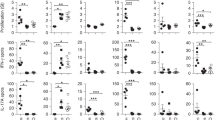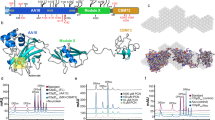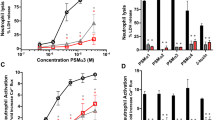Abstract
THE term leukin was proposed almost 60 years ago to denote a class of granulocytic antibacterial agents selectively active against Gram positive bacteria1. During the past decade, sufficient progress has been made to indicate the potential significance in host defence of such bactericidal agents. Knowledge of the chemical nature of a potent leukin present in rabbit neutrophiles first emerged in 1956. On the basis of high arginine (17 per cent) and low lysine (4.5 per cent) content, this leukin was considered to be a protamine derivative2. It was subsequently shown that bacteria undergoing dissolution within developing inflammatory lesions become progressively coated with a highly basic arginine-positive substance3, which is probably delivered to the bacterial surface during phagocytosis. Leucocytic granules, which contain the bulk of the bactericidal agent4, appear to fuse with phagocytic pouches containing bacteria and to release their contents into these pouches during degranulation5,6. Such a highly localized intracellular delivery system is probably most important because highly basic proteins or polypeptides would be neutralized and rendered less effective in an extracellular milieu. It is interesting that granulocytes from patients with an X-linked granulomatous disease seem to phagocytose normally but do not kill ingested bacteria7. The leucocytic defect is apparently related to improper degranulation rather than to a deficiency in the bactericidal agent8.
This is a preview of subscription content, access via your institution
Access options
Subscribe to this journal
Receive 51 print issues and online access
$199.00 per year
only $3.90 per issue
Buy this article
- Purchase on Springer Link
- Instant access to full article PDF
Prices may be subject to local taxes which are calculated during checkout
Similar content being viewed by others
References
Schneider, R., Arch. Hyg., 70, 40 (1909).
Skarnes, R., and Watson, D., J. Exp. Med., 104, 829 (1956).
Spitznagel, J., and Chi, O., Amer. J. Pathol., 43, 697 (1963).
Cohn, Z., and Hirsch, J., J. Exp. Med., 112, 983 (1960).
Robineaux, J., and Frederic, J., CR Soc. Biol., 149, 486 (1955).
Hirsch, J., J. Exp. Med., 116, 827 (1962).
Holmes, B., Quie, P., Windhorst, D., and Good, R., Lancet, i, 1225 (1966).
Bainer, R., and Nathan, D. (in the press, 1967).
Skarnes, R., and Watson, D., Bact. Revs., 21, 273 (1957).
Sakaguchi, S., J. Biochem. (Japan), 38, 91 (1951).
Hirsch, J., J. Exp. Med., 111, 323 (1960).
Felix, K., Adv. Prot. Chem., 15, 1 (1960).
Busch, H., Histones and Other Nuclear Proteins (Academic Press, New York, 1965).
Seegers, W., and Janoff, A., J. Exp. Med., 124, 833 (1966).
Zeya, H., and Spitznagel, J., J. Bact., 91, 750 (1966).
Butler, J., Expos. Ann. Biochim. Med., 21, 41 (1959).
Author information
Authors and Affiliations
Rights and permissions
About this article
Cite this article
SKARNES, R. Leukin, a Bactericidal Agent from Rabbit Polymorphonuclear Leucocytes. Nature 216, 806–808 (1967). https://doi.org/10.1038/216806a0
Received:
Revised:
Issue Date:
DOI: https://doi.org/10.1038/216806a0
This article is cited by
-
Primate defensins
Nature Reviews Microbiology (2004)
-
The respiratory burst of phagocytic cells is associated with a rise in vacuolar pH
Nature (1981)
-
L-Amino-acid Oxidase, a Bactericidal System
Nature (1970)
Comments
By submitting a comment you agree to abide by our Terms and Community Guidelines. If you find something abusive or that does not comply with our terms or guidelines please flag it as inappropriate.



